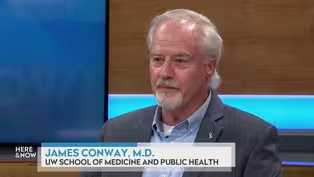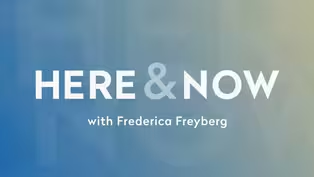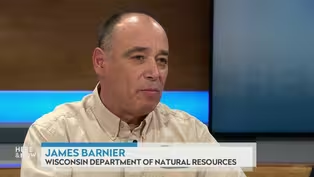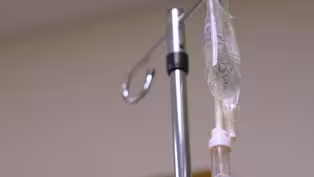Here and Now
Steven Deller On Tariffs, Job Numbers and Economic Trends
Clip: Season 2400 Episode 2405 | 4m 56sVideo has Closed Captions
Steven Deller on what new tariffs, jobs and spending figures mean for the economy.
UW-Madison agriculture and applied economics professor Steven Deller considers what new tariffs along with jobs report and consumer spending figures mean for Wisconsin's and the national economy.
Problems playing video? | Closed Captioning Feedback
Problems playing video? | Closed Captioning Feedback
Here and Now is a local public television program presented by PBS Wisconsin
Here and Now
Steven Deller On Tariffs, Job Numbers and Economic Trends
Clip: Season 2400 Episode 2405 | 4m 56sVideo has Closed Captions
UW-Madison agriculture and applied economics professor Steven Deller considers what new tariffs along with jobs report and consumer spending figures mean for Wisconsin's and the national economy.
Problems playing video? | Closed Captioning Feedback
How to Watch Here and Now
Here and Now is available to stream on pbs.org and the free PBS App, available on iPhone, Apple TV, Android TV, Android smartphones, Amazon Fire TV, Amazon Fire Tablet, Roku, Samsung Smart TV, and Vizio.
Providing Support for PBS.org
Learn Moreabout PBS online sponsorship>> A whole new spate of tariffs went into effect this week.
Job numbers were weaker than expected this summer, and business analysts say consumers are tightening their belts.
How do economic trends nationally translate to how Wisconsin is faring now and going forward?
We asked Steven Deller, UW-Madison professor of agricultural and applied economics, and thanks for being here.
>> Thank you.
>> So when you look at the broad economic landscape, what are you seeing.
>> From a Wisconsin perspective?
And I think this is kind of generally true across the country is a lot of businesses have gone into a wait and see mode.
That's why the job numbers are weak.
We're not seeing an increase in unemployment rates.
We're seeing a decline in the number of hires, primarily because businesses are unsure what's happening.
And when we're unsure, we kind of go into a lockdown mode.
We go into a holding pattern, if you will.
So I think that's why the job numbers are as weak as they are, and it's going to take a while for this to kind of play out.
>> And so this is this mostly around tariffs or interest rates or inflation or all of it.
>> I think it's all of it.
I think the major concern is that we're not sure exactly what the policies are going to be.
The tariffs are on.
The tariffs are off.
They're back on again.
They're off again.
And it's that uncertainty businesses I mean there's kind of we know what we know.
We know what we don't know.
We can make educated guesses.
And then what's going on.
That's uncertainty.
And when we're in a situation like that, that's when people just hunker down.
They go into wait and see mode.
And, you know, in terms of like consumers, it is kind of anticipatory shopping.
It is kind of like, okay, now let's go into a wait and see mode.
And it's just we don't know what's happening.
>> So you said that the trends kind of are the same nationally and in Wisconsin.
But is there anything specific to Wisconsin that we should be watching.
For?
>> Wisconsin?
Our highs, our growth periods are not as strong as the national averages.
Our lows are not as weak as the national averages.
So Wisconsin is kind of steady, if you will.
You have to go back to the farm crisis of the early 1980s, before Wisconsin kind of broke that trend.
So I think Wisconsin's going to be kind of in a stable mode for a little while.
>> And yet are the things that make Wisconsin more or less vulnerable to a downturn?
>> Not necessarily.
One of the reasons is because our economy is pretty diversified.
We don't we're not heavily dependent upon one particular industry.
I mean, you can point to some of the big ones, like agriculture, food recreation.
So there's some industries that maybe might be susceptible.
But in general, Wisconsin's a pretty diversified economy.
>> So all of this said, are you seeing indications of a slowdown nationally and in Wisconsin?
>> Yes.
And I think that's what the job numbers are saying.
And in talking with businesses around the state, and again, I tend to talk to the smaller businesses, which tends to dominate most of Wisconsin.
They're just in a again, a wait and see mode.
They're they're delaying expansion plans.
They're not going into shutdown mode.
And one of the reasons they're not going into shutdown mode is because they have such a difficult time hiring labor.
Wisconsin has been facing a structural labor shortage for years, long before Covid, and particularly coming out of Covid and businesses.
Remember that difficulty of hiring people, so they're really hesitant to lay people off because they don't want to go through that again.
So again, they're in that wait and see mode.
>> And so you're looking at kind of a business activity as a bellwether.
Are there others?
>> Yes.
One is consumer expenditures.
One of the things is we saw an increase in consumer expenditure after the announcement of the tariffs.
And the reason for that is people were thinking, oh, I'll buy it now.
I'll buy it before the tariffs hit.
So there was kind of a spike in spending from consumers.
Well that kind of spike has you know those purchases have played out now.
And now they're going into a wait and see mode.
So I think if we start to see consumer expenditures slow down much more than they already have, then that's a warning sign.
The other thing is we're seeing the housing market start to slow down, and there's other factors going on there.
But again, I think it's that reflection of just I'm going to delay making any major purchases because I'm not sure what's going to happen.
sure what's going to happen.
Dr. James Conway On Wisconsin's Risks of Measles Outbreaks
Video has Closed Captions
Clip: S2400 Ep2405 | 5m 2s | Dr. James Conway on a measles outbreak in Oconto County and a low state vaccination rate. (5m 2s)
Here & Now opening for August 8, 2025
Video has Closed Captions
Clip: S2400 Ep2405 | 56s | The introduction to the August 8, 2025 episode of Here & Now. (56s)
James Barnier On The Potential for Wildfire Around Wisconsin
Video has Closed Captions
Clip: S2400 Ep2405 | 4m 34s | James Barnier on risks of large and widespread wildfires as federal funding is cut. (4m 34s)
Why Complex Health Benefits Are a Focus of Patient Advocates
Video has Closed Captions
Clip: S2400 Ep2405 | 10m 30s | Patient advocates work to navigate complex health plans to find opportunity and options. (10m 30s)
Providing Support for PBS.org
Learn Moreabout PBS online sponsorship
- News and Public Affairs

Top journalists deliver compelling original analysis of the hour's headlines.

- News and Public Affairs

FRONTLINE is investigative journalism that questions, explains and changes our world.












Support for PBS provided by:
Here and Now is a local public television program presented by PBS Wisconsin



